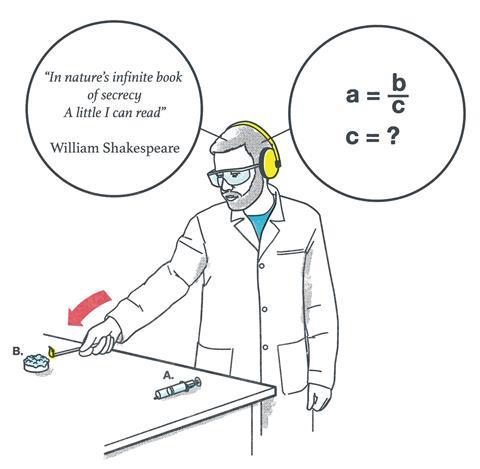Working with colleagues in English and maths departments can help your learners acquire essential literacy and numeracy skills

When students arrive in science classes, fresh from maths or English lessons, teachers might assume that those subjects have equipped them with literacy and numeracy skills that transfer easily to science. More often than not, this assumption is wrong. Better understanding the English and maths curriculums can be illuminating for science teachers.
Literacy
Reading
Closer inspection of the National Curriculum for England, for example, reveals little correlation between the literacy demands of English and science. This lack of cohesion will not be exclusive to England. According to the English programme of study for 11–14 year-olds, readers should ‘encounter a wide range of high-quality texts’. These should include pre-1914 and contemporary literature (prose, poetry and drama), Shakespeare and seminal world literature. Understandable for English, but of little help with literacy demands specific to science.
A potentially more relevant requirement is that pupils read a ‘wide range of non-fiction’ in English. Interpretations of this will vary between schools. For example, one might focus on autobiography, another on journalism and another on travel writing. Whatever they choose, their rationale will be guided by their expertise as English teachers, rather than the demands of other subjects in the secondary curriculum.
This raises the question of whether science teachers, and other non-English specialists, could contribute to English curriculum planning and the selection of non-fiction texts? Looking at a bookstore bestseller chart shows there is an appetite for popular science that could have a place in a secondary English curriculum or, at the very least, a school library. Giving time for heads of science and English to discuss non-fiction text selection could be a starting point for more curriculum cohesion. Scientists are readers too, yet how often does their expertise influence the reading diet of secondary-aged students?
Science teachers should not rely on their English colleagues to develop the literacy skills specifically required in science
Writing
As for the writing component, the National Curriculum for England is no less broad. It sets out the ‘wide range of purposes and audiences’ that students should write for. These include expository and narrative essays; stories, scripts, poetry and other imaginative writing; and notes and polished scripts for talks and presentations.
Here too, there is little correlation with the forms and modes of writing expected in science. Perhaps the closest link is the expectation of ‘summarising and organising material, supporting ideas and arguments with any necessary factual detail’. This too can take various forms. The understandable tendency in English is to teach this within the context of literature essays or non-fiction writing such as autobiography or speech writing. What English teachers consider to be ‘factual detail’ is likely to be a long way from the data sets and numerical evidence associated with science.

This article is part of our Teaching science skills series, bringing together strategies and classroom activities to help your learners develop essential scientific skills, from literacy to risk assessment and more.
Clearly, science teachers should not rely on their English colleagues to develop the literacy skills specifically required in science. This responsibility lies with the science teacher – a view substantiated by research. The Education Endowment Foundation published their Improving Secondary Science guidance report offering seven practical evidence-based recommendations for effective science teaching. The sixth of these is to prioritise the ‘language of science’ which should ‘develop scientific vocabulary and support pupils to read and write about science’.
It is an approach echoed by Ofsted in their own science research review. This asserts that ‘pupils need to learn about the different ways in which scientists engage in their work: through reading, talking, writing and representing science.’ This is called disciplinary literacy, which, it clarifies, ‘is not the same as teaching generic literacy strategies’.
Numeracy
Artihmetic
What of numeracy? Surely there are universals in mathematics that mean generic skills transfer more readily between maths and science? For any teachers that have encountered misconceptions surrounding line graphs, scattergraphs and the line of best fit, it seems clear that, here too, some caution is required. A student might spend the morning with their maths teacher expressing quantity as fractions, only to encounter an expectation in their science lesson that decimals are the order of the afternoon. For 16–18 year-old students of both physics and maths, the content itself can overlap, for example encountering equations of motion on the syllabus for either subject. From the students’ perspective, joined-up thinking between their different subject teachers seems sensible.
Again, the Ofsted review offers some perspective, warning that teachers should ‘not assume that pupils can easily transfer their learning from mathematics to the science classroom’. It puts the case that subject leaders and maths teachers should work together to understand how and when knowledge taught in their respective subjects is similar and when it is different. Interestingly, it acknowledges that the two subjects are unlikely to share a mutually vested interest in sharing ideas. This is because science depends on mathematics, but mathematics does not depend on science.
The implication is that science teachers cannot take collaboration between subjects for granted. If school leaders are serious about both literacy and numeracy, they must create more time and opportunity for this collaboration to happen.
Recommended resources
- Search the Literacy in science teaching collection for resources and ideas to help you to develop the literacy skills your learners need for science.
- Help your learners translate their maths lessons into a scientific context with our maths skills worksheets.
- Show learners ways that scientists use their skills and make a difference to the world, with our collection of job profiles on A Future in Chemistry.









1 Reader's comment